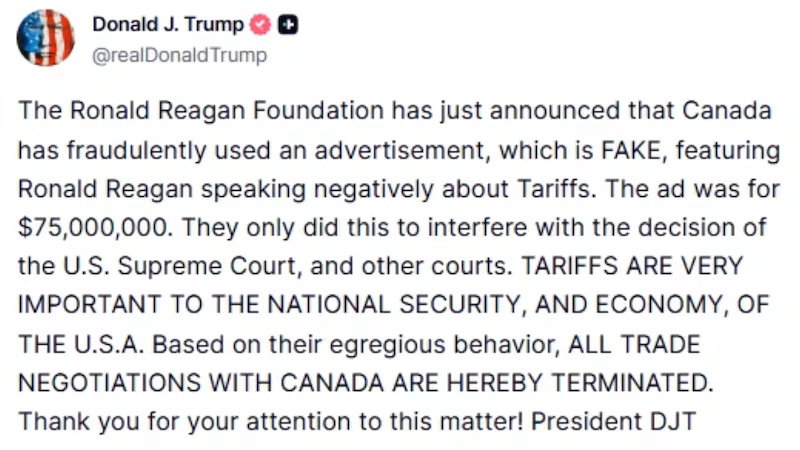Why It Matters:
The ad, which criticized U.S. tariffs, was condemned by the Ronald Reagan Presidential Foundation for misrepresenting Reagan's views without authorization. Trump labeled the ad as "fraudulent" and accused Canada of attempting to influence U.S. court decisions regarding tariff policies.
Trump posted, "Based on their egregious behavior, ALL TRADE NEGOTIATIONS WITH CANADA ARE HEREBY TERMINATED."
This abrupt termination of trade talks marks a significant escalation in U.S.-Canada relations, which have been strained by ongoing disputes over steel, aluminum, and automobile tariffs.

Beyond Canada, the Trump administration has been implementing extremely high tariffs on multiple countries, aiming to protect domestic industries. These protectionist measures, however, have begun to strain the U.S. economy itself. Rising import costs have fueled inflation, disrupted supply chains, and increased prices for American consumers. Meanwhile, key trading partners are seeking alternative markets, reducing their economic engagement with the U.S., which further pressures domestic industries.
The combination of global pushback and domestic economic pressures has made trade policy a major political and economic challenge for the Trump administration, influencing public opinion and raising concerns about long-term competitiveness.
The Bigger Picture:
This development underscores escalating tensions between the U.S. and its trading partners over protectionist policies. Canadian Prime Minister Mark Carney has signaled plans to diversify Canada’s export markets away from the U.S., aiming to reduce dependence on American trade. The move could prompt a realignment of global trade relationships, as Canada and other nations pursue stronger economic ties beyond the U.S.
The controversy also underscores the influence of media and political messaging in shaping international trade policy. Ontario’s use of Reagan’s image in the ad campaign has sparked debates over the ethical use of historical figures in political messaging and the potential diplomatic repercussions of such actions.
As the situation develops, it remains to be seen how this dispute, alongside broader U.S. tariff policies, will influence future trade negotiations and the broader geopolitical landscape.
Go Deeper:
U.S.-India Relations Deteriorate Under Trump Administration
Brazilian President Slams “Tariff Blackmail” Targeting BRICS Nations
China Calls Trump's Tariffs Bullying Tactics
Trump Retreats From Trade War With China; Tariffs Will Be Reduced
F.abedi - A.Akbari

